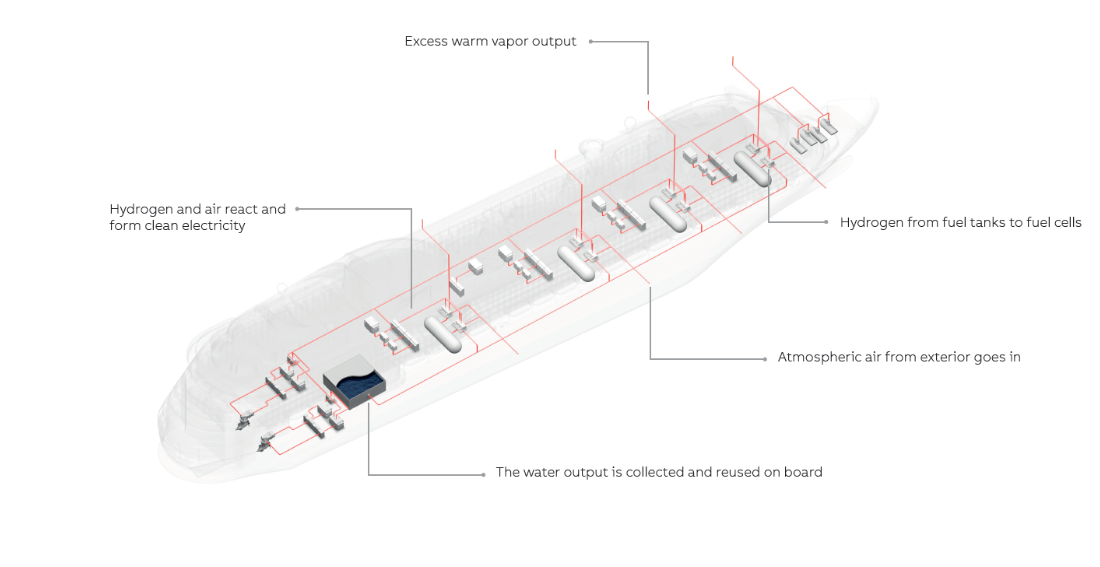

The development of the zero-emission ships will require continuous technological innovation to get the industry to its ultimate objective of decarbonizing shipping.
As such, the path toward a green future will not be unified as the industry would have to rethink the ways it has been building ships so far and come up with alternatives.
These will incorporate various technological advancements when it comes to ship design, propulsion, energy efficiency, navigation, and a multitude of alternative marine fuels.
Fuel cells as a zero-emission propulsion solution for marine applications are expected to play a significant role in that process. And, we might be even closer to a future where large trans-oceanic ships are powered by fuel cells than we think.

“With its power capacity having grown over the last decade, the fuel cell asserts its position as a viable source of marine energy – and not only as a means of supporting auxiliary energy requirements or powering smaller ships,” Jostein Bogen, product manager for energy storage and fuel cells at ABB Marine & Ports, told our publication in an interview.
“The technology is responsive enough to be used as a general energy source for most loads on electric ships – and can be deployed in combination with batteries to yield additional benefits. For example, vessels that operate predominantly on diesel engines could employ fuel cells to boost efficiency and comply with regulations in areas such as fjords and zero-emission ports.”
Indeed, short-distance shipping is believed to be the first adopter of this technology. However, as explained by Bogen, it is feasible for deep-sea shipping, at least as an auxiliary power source.
“It is only a matter of time before the many advantages of fuel cell technology are within the grasp of the entire maritime sector,” he added.
How does a fuel cell work?
As explained by ABB, fuel cells generate energy through an electrochemical reaction and there is no combustion involved.
The fuel cell converts fuel directly to electricity and heat and, unlike in batteries, there is no need to periodically recharge since a fuel cell continues to produce electricity as long as a fuel source is provided.
ABB’s fuel cell system is based on the Proton exchange membrane (PEM), which converts the chemical energy from hydrogen into electricity through an electrochemical reaction with oxygen, emitting only clean water and heat.
The company says that its hydrogen PEM fuel cell is applicable to high and low voltage, AC and DC power systems, and can be used in combination with batteries or engines. The system can be 100% hydrogen-electric or integrated as a hybrid power system.

Fuel cells have higher efficiency than combustion engines, and the technology allows energy to be concentrated more densely than in petroleum fuels. If renewables are used to produce the hydrogen fuel, the entire energy chain will be clean, providing a true zero-emission fuel.
“Although hydrogen is generally preferred because of its greater efficiency, ammonia’s and methanol with higher volumetric energy density makes it a good choice for deep-sea shipping. Going forward, we believe we will see companies using a mix of energy carriers depending on their needs,” Bogen explains.
When can we expect to scale up?
“We foresee fuel cells being scaled up from a few hundred kilowatts to megawatts by 2022 to 2023. This will make them a feasible power source for a greater variety of vessel types, including large, ocean-going vessels. Fuel cells are being produced at a larger scale, their cost is coming down, and they are becoming more compact,” Bogen added.
“This is a technology that is progressing rapidly, and it will soon be helping the industry as a whole to meet its targets for CO2 reduction.”
ABB has been exploring the potential of fuel cell power systems for a number of years now in cooperation with industry majors.
Last month, ABB signed a Memorandum of Understanding (MOU) with Hydrogène de France to jointly manufacture megawatt-scale fuel cell systems capable of powering ocean-going vessels.
The duo intends to optimize fuel cell manufacturing capabilities to produce a megawatt-scale power plant for marine vessels.
The new system will be based on the megawatt-scale fuel cell power plant developed by ABB and Ballard, and they want to have the systems manufactured at HDF’s new facility in Bordeaux, France.
ABB and Ballard have been working on optimizing existing kilowatt-scale fuel cell technologies since 2018 to create a pioneering megawatt-scale solution suitable for powering larger ships, with an electrical generating capacity of 3MW (4000 HP). The new system is envisaged as fitting within a single module no bigger in size than a traditional marine engine running on fossil fuels.
The company has also been working with Norwegian shipyard Fiskerstrand and SINTEF Ocean to test the viability of fuel cells as an energy source for short-distance ferry operations.
Furthermore, ABB’s fuel cell technology is being deployed on Finnish research vessel Aranda as part of the European Union-funded project ‘MARANDA’ and the company is also developing a fuel cell-based power and propulsion system for a newbuilt push boat. due for delivery in 2021.
Challenges and outlook
The potential of fuel cells as a zero-emission solution for shipping cannot be disputed and ABB is making sure solutions will be ready when the time comes. However, there are some challenges ahead.
Bogen noted that one of the biggest challenges for a large-scale uptake and commercialization of fuel cell systems at the moment are sustainable supply chains, or better said the lack thereof, the establishment of which will determine the adoption pace of the technology.
In conclusion, commenting on the distribution of fuels of the future and the potential dominant solution, Bogen said:
“In order to meet the targets set by the IMO and in the Paris agreement, we believe that carbon-neutral or carbon-free fuel will take a dominant position in the long term. Common for most carbon-free fuels is that they are produced from hydrogen, so we believe hydrogen will be an important energy carrier in the future.”
The post ABB: Large ships powered by fuel cells are on the horizon appeared first on Offshore Energy.
